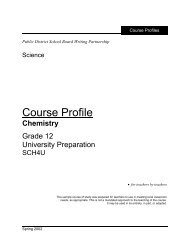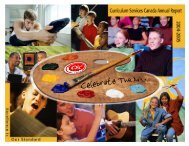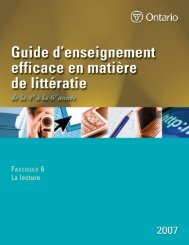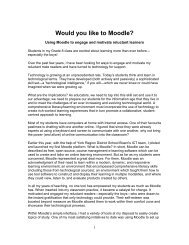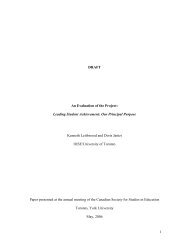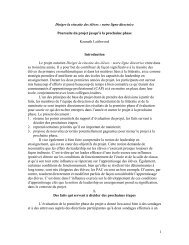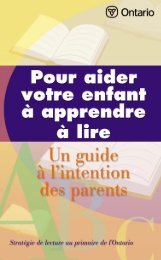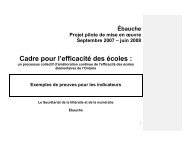a history of curriculum services canada
a history of curriculum services canada
a history of curriculum services canada
Create successful ePaper yourself
Turn your PDF publications into a flip-book with our unique Google optimized e-Paper software.
VII. 1997<br />
January - March<br />
The new year began optimistically with the issue <strong>of</strong> copyright for The Evaluation Tool finally<br />
resolved. OCC had written agreement from MET to sell The Evaluation Tool for a period <strong>of</strong> two<br />
years, from 1 January 1997 to 31 December 1998. This tool, now renamed The Evaluator, was<br />
in its final design stage and was to be presented by the end <strong>of</strong> the month for final review.<br />
Advertising for The Evaluator had been ongoing during its development stage and OCC was<br />
now keeping a list <strong>of</strong> potential orders.<br />
A list <strong>of</strong> potential commercial and corporate buyers for the learning materials was also being<br />
developed, and the decision was made to hire a member <strong>of</strong> the former Evaluation Team on<br />
secondment to set up a review team which would review all materials and develop and deliver<br />
training programs. Early feedback indicated that many <strong>of</strong> the materials in the catalogue did not<br />
meet the evaluation criteria and were thus unacceptable. It was suggested that OCC’s efforts to<br />
establish product endorsement could be assisted by providing developers with specific criteria<br />
before products were submitted to OCC for review.<br />
The first steps toward revision <strong>of</strong> OCC’s policies and by-laws were also taken in January. These<br />
changes were necessary to fulfill the new legal status <strong>of</strong> incorporation, and it was agreed that<br />
subsequent updates would be initiated over time as needed. Amongst the changes addressed was<br />
a conflict <strong>of</strong> interest clause specifying the parameters <strong>of</strong> directors’ responsibilities to OCC, a<br />
concern raised in 1996. Also <strong>of</strong> relevance was the change in voting status for Ministry<br />
representatives now that OCC was incorporated. Although MET representatives were now no<br />
longer able to vote or chair committees, their physical presence on the Board was actively<br />
encouraged in an attempt to maintain strong relationships with the Ministry.<br />
Funding, however, remained the main agenda <strong>of</strong> the new year. OCC’s three-year funding<br />
agreement with MET and OPSBA was coming to an end on 31 March 1997. A business plan<br />
presentation to MET <strong>of</strong>ficials was scheduled for February, with OCC’s financial requirements<br />
from MET rationalized in detail and forecast to the year 2001. Included in this plan was the idea<br />
that OCC would take over ownership <strong>of</strong> assets from OPSBA.<br />
Initial response to the presentation was very positive. Ministry <strong>of</strong>ficials were favourable towards<br />
the idea <strong>of</strong> seeking private sector partnerships and suggested that, in future, representatives <strong>of</strong><br />
the private sector should be included on the OCC board and more actively involved in OCC.<br />
The Ministry also liked the idea <strong>of</strong> using revenues for merit awards and for funding the<br />
development <strong>of</strong> learning resources in schools and boards, thus focusing on more grassroots<br />
development. Questions were raised about the process (e.g., electronic “connectivity”) by which<br />
OCC could work with other organizations and consortia, and stronger connections with ILC<br />
were encouraged. This last point came out <strong>of</strong> MET’s ongoing concern for more connectivity<br />
©2008 Curriculum Services Canada 37



